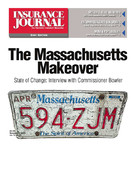Thoughts on the charges and investigations triggered by New York Attorney General Spitzer –and are people in the industry talking about anything else?
Insurance professionals, young and old, are genuinely shocked over the bid rigging charges and deeply concerned over their potential to tarnish the image of the entire industry. Most agree that there is no excuse for price fixing and wonder how industry veterans could have allowed it to go on for any period of time without blowing the whistle. They are outspoken in calling for violators to be prosecuted fully.
Do people honestly think this case is an argument in favor of federal oversight? Wasn’t it a state official, acting in concert with state insurance regulators, who uncovered the mess? How does one go from this to arguing for a federal bureaucracy?
It’s easy to take umbrage whenever a politician makes charges, but does it matter what Spitzer’s motivations are if the worst charges are true? The politics of the probe should be a non-issue–for public officials as well as for the industry. Maybe that’s naïve but …
How the National Association of Insurance Commissioners responds could go a long way toward securing the future of state regulation. It may not be the quickest organization around but correctness of response is preferable to speed. Most expect some type of model law on disclosure.
Incentive payments may be the “American way” but so are ethics and fair dealing. That is not to suggest that such arrangements are unfair or unethical, just that flag-waving is a defense that can be manipulated.
Just because they have existed for a long time may not make sales incentive plans right but it does suggest that buyers have had plenty of time to complain if they were bothered by them.
How can disclosure be meaningful if the dollars attached to contingent agreements are uncertain at the time of the sale and only become known later?
Will disclosure requirements be worth the trouble or will all parties simply do away with contingencies as the major brokers say they are doing?
Insurers may not pay contingent monies but will still end up paying the same aggregate amount to obtain and keep business, and will still seek ways to reward those who bring them their best business.
To the extent contingent commissions are paid on personal lines, are the dollars ever enough money to influence an agent’s choice for a consumer?
What’s the message sent by public officials when criminal charges are dropped in exchange for other concessions?
What’s with the sudden compassion displayed by consumer groups for large corporate buyers of insurance allegedly harmed by rigged bids or contingent fees?
Large fines are almost certain but in the end who really pays those?
Could all of this be a plot by trial lawyers to take over the insurance industry, given that the new head of Marsh is a former trial lawyer and used to be Spitzer’s boss?
Was this article valuable?
Here are more articles you may enjoy.


 AIG Files Amended Suit Against Former Execs, Dellwood Insurance
AIG Files Amended Suit Against Former Execs, Dellwood Insurance  Biden Administration Raises FEMA Bar for Flood Resilience
Biden Administration Raises FEMA Bar for Flood Resilience  Marsh McLennan Agency to Acquire The Horton Group
Marsh McLennan Agency to Acquire The Horton Group  Progressive Q2 Net Income Skyrockets Over 320%
Progressive Q2 Net Income Skyrockets Over 320% 


